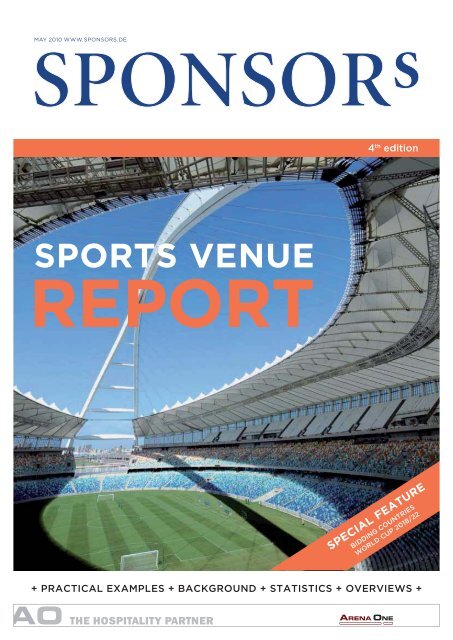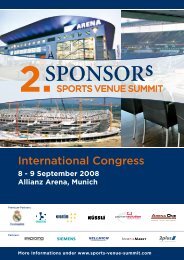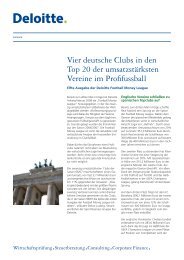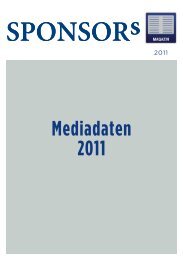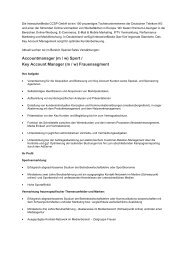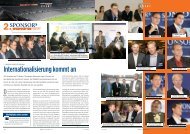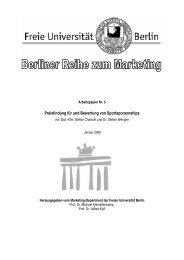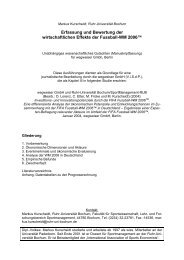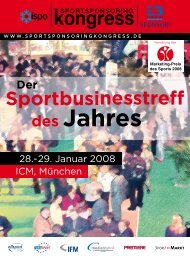sports venue report special feature - SPONSORs
sports venue report special feature - SPONSORs
sports venue report special feature - SPONSORs
Create successful ePaper yourself
Turn your PDF publications into a flip-book with our unique Google optimized e-Paper software.
MAY 2010 WWW.SPONSORS.DE<br />
SPORTS VENUE<br />
REPORT<br />
4 th edition<br />
SPECIAL FEATURE<br />
BIDDING COUNTRIES<br />
WORLD CUP 2018/22<br />
+ PRACTICAL EXAMPLES + BACKGROUND + STATISTICS + OVERVIEWS +<br />
THE HOSPITALITY PARTNER
Imprint<br />
NEWS<br />
Construction 6<br />
Host Cities and Bidding Countries 36<br />
Management 46<br />
CONSTRUCTION<br />
Stadium Projects 8<br />
Stadium Construction projects in the top five football<br />
leagues in Europe.<br />
Great Stadiums for a Grande Nation 10<br />
Should France win its bid for the 2016 EURO, a wave<br />
of renovation and reconstruction projects could<br />
sweep the country, ultimately providing new sources<br />
of re<strong>venue</strong> for the Ligue 1 clubs.<br />
London’s Legacy 16<br />
London not only wants to use the Olympic Games<br />
2010 to prove itself as a host, they also hope to<br />
revitalize a downtrodden region.<br />
WORLD CUP 2018/22<br />
Decision Day: December 2nd, 2010 22<br />
In just seven months, FIFA will decide who will host<br />
the World Cups 2018 and 2022.<br />
Belgium & Holland<br />
want a compact World Cup 24<br />
Harry Been, CEO of the Holland Belgium Bid Committee,<br />
on the advantages of a compact World Cup.<br />
Bringing the World Cup back to England 26<br />
Andy Anson, CEO of the English Bid Committee,<br />
on what could be the first World Cup on the island<br />
since 1966.<br />
Japan focuses on Security 28<br />
Tetsu Hirai, director of the International Relations<br />
Devision of the Japanese Bid Committee, explains<br />
why their chances of winning are good.<br />
Publisher and Editor<br />
Manfred Schlösser<br />
Executive Editor-in-Chief and Co-Editor<br />
Marco Klewenhagen<br />
SPONSOR S Editorial Team<br />
Steffen Guthardt, Philipp Klotz, Tobias Kuske,<br />
Florian Oediger, Daniel Primke, Holger Rehm,<br />
Benjamin Reister, Kathrin Schmidt,<br />
Lukas Stelmaszyk<br />
Editorial Office<br />
Locke McKenzie, Stefan Sirucek<br />
Freelancers<br />
Stefan Krüger, Florian Kunth<br />
Event Team<br />
Philipp Klotz, Juliane Nocker, Daniel Primke<br />
Marketing & Sales<br />
Holger Reitlinger, Kirsten Rhein, Philip Rieneck,<br />
Sophie-Charlotte Sassmannshausen<br />
2010 SPORTS VENUE REPORT<br />
Layout<br />
EHS Edition Hamburger Satz-Druck GmbH,<br />
Industriestr. 10, 22869 Schenefeld, Germany<br />
Managing Director: Mike Reschke<br />
Creative Direction: Michael Braack<br />
Art Direction: Katharina Sichwart<br />
Print<br />
Druckerei Siepmann GmbH,<br />
Ruhrstr. 126, 22761 Hamburg, Germany<br />
Publisher<br />
SPONSOR S Verlags GmbH,<br />
Donnerstr. 10–20, 22763 Hamburg, Germany,<br />
Tel: +49 (0)40/413 30 08-0,<br />
Fax: +49 (0)40/413 30 08-19,<br />
E-Mail: info@sponsors.de<br />
Subscriptions & Accounting<br />
SPONSOR S Verlags GmbH, Kerstin Praß,<br />
Dekan-Laist-Str. 17, 55129 Mainz, Germany,<br />
Tel: +49 (0)6131/958 36-23,<br />
Fax: +49 (0)6131/958 36-6,<br />
E-Mail: prass@sponsors.de<br />
Qatar’s Vision 30<br />
Nasser Al Khater, communications director of the<br />
Qatar Bid Committee, on their environmentally<br />
friendly stadium concept.<br />
Russia hoping for a beginners advantage 32<br />
Alexey Smertin, sport director for the Russian Bid<br />
Committee, on the challenges of creating a nationally<br />
representative event.<br />
U.S. growth market a big plus 34<br />
David Downs, Executive Director of the USA Bid<br />
Committee, explains why the U.S.’s chances for<br />
2022 are better than 2018.<br />
MANAGEMENT<br />
Springboarding off Major Events 38<br />
A recent study investigated things countries can do<br />
to stimulate their economies and their social and<br />
political infrastructure through major events.<br />
Arena Job Market 40<br />
Every year sporting events and concerts attract<br />
millions of people to stadiums and arenas. A Look<br />
behind the scenes of a multi-million euro market.<br />
The Generation Question 44<br />
Since 2004 FIFA has permitted teams to play<br />
football games on <strong>special</strong>ly certified artificial turf<br />
fields. Despite the clear economic advantages artificial<br />
truf presents, it has yet to come into play.<br />
FACTS AND FIGURES<br />
Sport Events 2010 48<br />
Major Sport Events 2011-2016 49<br />
Major Sport Events 2016-2022:<br />
Bidding Cities & Countries 49<br />
Bidding Opportunities 2011-2018 50<br />
CONTENTS<br />
SPONSOR S – Wissen fürs Sportbusiness · ISSN 1432-8925<br />
5 products, 1 subscription!<br />
Receive the most important information from the <strong>sports</strong><br />
industry with a subscription to the SPONSOR S Magazine.<br />
A subscription is valid for twelve months and includes:<br />
• SPONSOR S magazine (twelve issues)<br />
• SPONSOR S online news (daily access to a<br />
password-protected area)<br />
• SPONSOR S archive (daily access to a password-<br />
protected area)<br />
• SPONSOR S newsletter (five per week, via email)<br />
• SPONSOR S Reports* (to date, the following<br />
publications have been issued: SPONSOR S Agency Report,<br />
SPONSOR S Sports Media Report, SPONSOR S Sports Venue<br />
Report and SPONSOR S Club Manager Report)<br />
Further information about the services and conditions<br />
of a SPONSOR S subscription and a free five-month trial<br />
subscription are available online at www.sponsors.de/<br />
abonnement.<br />
* Complimentary postage to SPONSOR S subscribers is a regular,<br />
voluntary service offered by SPONSOR S Verlags GmbH<br />
5
GREAT<br />
STADIUMS FOR<br />
A GRANDE<br />
NATION<br />
On average, Ligue 1 stadiums are 60 years old,<br />
which is too old and outdated for today’s standards.<br />
Should France win its bid for the 2016 EURO on<br />
May 28th of this year, a wave of renovation and<br />
reconstruction projects could sweep the country. If<br />
that happens, increased re<strong>venue</strong>s through ticketing,<br />
catering, and hospitality, would bring the Ligue 1<br />
clubs profits like never before.<br />
AUTHOR: KATHRIN SCHMIDT<br />
Nicolas Sarkozy is making his country’s bid for the 2016 EURO<br />
a top priority. Last year, the French president created a legal<br />
statute declaring that the EURO campaign was of national<br />
interest. Later he announced that he was prepared to provide<br />
150 million euros of government money should UEFA<br />
award France the EURO at their meeting on May 28th, 2010 in<br />
Nyon, Switzerland.<br />
The question of what the government would do with all the<br />
money has already been decided. The millions would go towards<br />
completing one of the country’s most important construction projects:<br />
the renovation of its largely outdated and obsolete stadiums.<br />
The Stade de France, which is the home field of the French national<br />
team, is the most recently constructed stadium in the country. It<br />
was completed for the 1998 World Cup.<br />
Christophe Bouchet, general director of the Lagardère Sports<br />
subsidiary Sportfive, spoke frankly about the issue. “The stadiums<br />
in France are on average 60 years old,” he said, “because of this we<br />
are far behind our European neighbors like England, Portugal, or<br />
Germany.”<br />
In order to get its stadium infrastructure ready for the EURO<br />
2016, France will need around 1.95 billion euros. According to a<br />
University of Limoges study, that’s the price tag for building seven<br />
new stadiums and renovating six others. In preparation, the study<br />
calculated these figures as well as the predicted earnings for the<br />
2014-15 season based on data from the 2007-08 season and available<br />
information on the new stadium projects.<br />
On behalf of Sportfive, the researchers analyzed how both the<br />
13 affected clubs and the state could afford to pay for the coming<br />
wave of renovations. They found that it would eventually mean<br />
more money for the clubs through ticketing, hospitality, and catering.<br />
The projections provide evidence that the earnings from these<br />
three sectors could more than double in the new stadiums.<br />
Putting all 13 new or renovated stadiums together, researchers<br />
have calculated re<strong>venue</strong>s of 18 million euros in gastronomy (compared<br />
to 6 million euros in 2007-08) around 136 million euros for<br />
LE GRAND STADE: 60,000 spectators will celebrate the completion of<br />
10 2010 SPORTS VENUE REPORT
CANDIDATES<br />
BRINGING THE WORLD<br />
CUP BACK TO ENGLAND<br />
England wants to host the FIFA World Cup in 2018. If they succeed, it will be the first time since 1966 that<br />
they’ve managed to get football’s premier event back to the island. In order to reach this goal, the England<br />
2018 Bid Committee is placing particular emphasis on the <strong>special</strong> role football has played in England,<br />
and the celebrated status football in England has achieved in the world. Highlights include their tradition<br />
of quality football infrastructure, the distinguished reputation of their league, and last but not least,<br />
David Beckham.<br />
AUTHOR: HOLGER REHM<br />
The English Football Association (FA) has fond memories of the last<br />
time England hosted the FIFA World Cup. Wembley Stadium, London,<br />
1966. 98,000 spectators witnessed the goal that wrote history.<br />
Geoff Hurst’s controversial shot secured not only the 4:2 victory for<br />
the “Three Lions” over Germany, but also landed England their first,<br />
and what would remain their only, World Cup title to date. And it all<br />
happened on home soil, to boot.<br />
In the 44 years that have gone by since 1966, the English national team<br />
has been unable to claim another international title for themselves of<br />
this level. As the 1996 UEFA EURO in England has long since come and<br />
gone, it has now been 14 years since a large-scale football tournament<br />
was hosted on English soil. “It’s been too long for the English people,”<br />
explained Brian Barwick, former CEO of The FA (2005-2008). With a large<br />
part of the population in favor of the bid, he is not alone in his wish to<br />
see the World Cup return to England.<br />
With a six-person board, a five-person advisory group, and eight vicepresidents,<br />
which include David Beckham and national coach Fabio Capello<br />
among their ranks, England has assembled a large team to guide their<br />
bid for the 2018 FIFA World Cup.<br />
Infrastructure, Tradition, and Beckham<br />
England has promised 2018 to be “the most commercially-successful FIFA<br />
World Cup in history”, should they be awarded the tournament. According<br />
to Andy Anson, England 2018’s CEO, the country will have “a highly developed<br />
and innovative technical offering including an excellent blend of<br />
iconic stadia and new-builds.”<br />
England officially launched its campaign on May 18th, 2009 to a crowd<br />
of cheering supporters in Wembley Stadium. The host city selection process<br />
was kicked off on this date as well, as English cities were invited to<br />
apply to become one of the 12 Candidate Host Cities included in the bid<br />
book. 15 applications were submitted to England 2018 on the 26th of November,<br />
2009, and the victorious 12 were announced less than a month<br />
later, on December 16th, 2009. The 12 selected cities put forward a total<br />
of 17 stadiums for England’s Bid Book; among those included were<br />
Manchester’s Old Trafford, London’s new Wembley and Emirates stadiums,<br />
and Liverpool’s Anfield Stadium (current or as new build).<br />
Another point for England’s candidature is that they appear to be wellequipped<br />
for hosting an event of this magnitude, e<strong>special</strong>ly when one<br />
examines their road, rail, and air infrastructure. Air services directly<br />
connect England to 185 airports in World Cup qualifying countries.<br />
On top of all of these selling points is the obvious fact that England is<br />
a country crazy about football. This is a fundamental part of their bid.<br />
England’s quarterfinal loss to Portugal during Germany’s 2006 World Cup<br />
boasted around 30 million domestic viewers. That constitutes more than<br />
half of England‘s population. The FA Cup and Premier League further<br />
FIFA World Cup 2018<br />
Bidding Nation: England<br />
England 2018<br />
Phone: +44 (0) 20 7745 5621<br />
Mail: dan.connolly@theFA.com<br />
Net: www.england2018bid.com<br />
Bid Committee:<br />
David Triesman (Bid Committee Chairman)<br />
Andy Anson (CEO of the Bid Committee)<br />
Budget:<br />
24.6 Million US Dollars<br />
Sponsors/Partners:<br />
Official Partners: BT, Morrisons, Pricewaterhouse Coopers<br />
Official Supporters: npower<br />
Official Suppliers: Alpha CRC, AT Internet Ltd, Browns<br />
Design Associates Ltd, Cutting Edge Group, e-circle,<br />
i-Level Ltd, IVS Group Limited, OMMprint, Pitch Media<br />
Limited, Pmpgenesis Legacy, Reform Digital, Stoke Park,<br />
STR Global, Tamba Internet<br />
Potential Venues:<br />
Stadium Capacity City<br />
Villa Park 47,300 Birmingham<br />
Ashton Vale 44,000 Bristol<br />
Elland Road Stadium 51,240 Leeds<br />
Wembley Stadium 84,700 London<br />
Emirates Stadium 60,000 London<br />
White Hart Lane 58,000 London<br />
or Olympic Stadium 66,995 London<br />
Anfield Stadium 44,000/72,334 Liverpool<br />
(current/new stadium)<br />
Old Trafford 75,979 Manchester<br />
City of Manchester 47,717 Manchester<br />
Stadium<br />
Stadium MK 44,000 Milton Keynes<br />
St James’ Park 52,409 Newcastle Gateshead<br />
City Ground 45,300 Nottingham<br />
Home Park 43,874 Plymouth<br />
Hillsborough 43,946 Sheffield<br />
Stadium of Light 48,707 Sunderland<br />
Recent Large Sport Events:<br />
• Commonwealth Games 2002<br />
• UEFA Euro 1996<br />
26 2010 SPORTS VENUE REPORT
ARENA JOB MARKET<br />
Every year sporting events, concerts, and business gatherings attract millions of people to stadiums and<br />
arenas around the world. In football stadiums and multipurpose arenas alike, the organizational machinery<br />
works at full steam day and night to keep operations running smoothly. Using Germany as an example,<br />
SPONSORS takes a look behind the scenes of a multi-million euro market.<br />
AUTHORS: FLORIAN OEDIGER AND STEFFEN GUTHARDT<br />
Credit: Getty Images<br />
Credit: Getty Images<br />
If everything goes according to plan,<br />
“the first fans will arrive at the stadium<br />
at around 12:30p.m.,” security guard<br />
Peter Siegert says to the crowd. “Today<br />
is a big day, so keep alert. We can’t have<br />
any slip-ups.” Today Northern Germany’s<br />
biggest rivals, Hamburger SV and Werder<br />
Bremen, meet.<br />
Just one week before, there was a meeting<br />
of all service providers responsible for<br />
game day operations. Whether its catering,<br />
security, cleaning or hostessing:<br />
“For their money our guests expect premium<br />
service and total security. Unbridled<br />
enjoyment is really what they’re looking for<br />
at our events,” reminds Kurt Krägel, director<br />
of arena operations and organization at<br />
the HSH Nordbank Arena in Hamburg.<br />
In order to fulfill these demands – not<br />
only in Germany, but in stadiums around<br />
the world – everything has to run smoothly:<br />
before, during and after the game. This<br />
requires a small army of service providers<br />
darting around the stadium throughout the<br />
event. This enormous machine is generally<br />
held together by the operating company<br />
of the <strong>venue</strong>, or by the resident club, which<br />
contracts tradesmen, hosts/hostesses and<br />
janitorial staff.<br />
3.5 million euros per club<br />
As Germany’s example has shown, the<br />
<strong>sports</strong> <strong>venue</strong> labor market is a very notable<br />
component of the economic machine.<br />
“Construction costs only make up about 15<br />
percent of total stadium expenditures. On<br />
the other hand, 85 percent of all costs are<br />
incurred by <strong>venue</strong> operations in the following<br />
20 years,” says Stefan Leibhard, managing<br />
director of the IT management company<br />
BTD. Among other projects, his company<br />
is exclusively responsible for the organization<br />
and maintenance of technical<br />
infrastructure in the Allianz Arena in Munich,<br />
Germany.<br />
In order to ensure effective game operations<br />
on their home turf during the 2007-08<br />
season, Bundesliga affiliates had to spend<br />
around 3.5 million euros each for the necessary<br />
services. When you calculate the<br />
expenditures of all 13 clubs in the<br />
Bundesliga’s first league together, you get<br />
a sum of 63 million euros.<br />
For a single multipurpose arena in Germany,<br />
the average annual costs of external<br />
services come in at just under five million<br />
euros. The reason? While these modern<br />
indoor event temples may be smaller than<br />
their outdoor football counterparts, they<br />
accommodate considerably more events.<br />
Industry experts estimate the percentage<br />
of total costs external service providers<br />
incur to be around 15 to 20 percent for a<br />
single arena event.<br />
18,000 external associates<br />
Statistics from the German Football League<br />
(DFL) only confirm the significant volume<br />
of this market. According to their figures,<br />
the number of people working for licensed<br />
football alone over the 2007-08 season came<br />
to 37,684. Not surprisingly, the largest of<br />
these markets is the Bundesliga’s first<br />
league, which provides jobs for 25,615 employees.<br />
That is not to say that all of these hardworking<br />
associates are on location for every<br />
game, but most of them are. Take the<br />
number of service crew members necessary<br />
for one Bundesliga game day as an example:<br />
During the 2007-08 season, this<br />
group comprised a total of 17,984 workers.<br />
These, largely subcontracted, stadium employees<br />
make up around 70 percent of the<br />
total labor market for the Bundesliga’s first<br />
league (see graphic: “Indirect Employees”).<br />
The two major services for German football<br />
stadiums are the security sector, with<br />
7,160 employees, and the catering segment,<br />
with 7,680. By international standards, the<br />
large size of the catering division is evident<br />
when compared with that of France. Taking<br />
all 13 Ligue 1 clubs together, there are only<br />
492 people dispensing food and drinks on<br />
game day. Even if French stadiums expand<br />
their capacities through new constructions<br />
and modifications, experts say they still<br />
don’t expect more than 1,400 employees to<br />
be working the kitchens and kiosks of the<br />
top 13 French clubs.<br />
In the Bundesliga, on the other hand,<br />
more than 85 percent of all external stadium<br />
employees are either involved in the wor-<br />
40 2010 SPORTS VENUE REPORT


